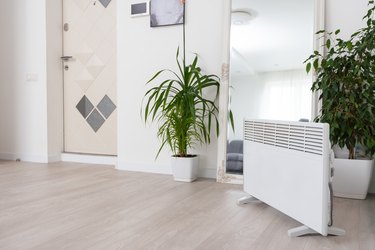
Space heaters can provide an affordable temporary solution to cold rooms in the wintertime. If you rent or if you can't yet afford to make a permanent insulation upgrade to your home, space heaters can fill the gap nicely. When used properly, infrared heaters and other space heaters are fairly safe, but you do need to take a few precautions. Here's what to know about the potential risks of infrared heaters — and how to use them safely.
How Infrared Heaters Work
Video of the Day
Many space heaters are convection heaters that warm air and then blow it into the room. Infrared heaters work differently. They create infrared radiation that travels through the air in the form of electromagnetic (EM) waves. These EM waves travel freely through the air until they reach a solid object. When they do, they transfer heat directly to that object. In this way, infrared heat warms the furniture and other materials in the room, including you.
Video of the Day
If you've been reading closely, you may have noticed the word "radiation," which can be scary. In this case, however, there is no need to worry. Humans cannot see infrared radiation, but they can feel it in the form of heat, and they are exposed to it every day. In fact, 50 percent of the sun's energy reaches Earth in the form of infrared energy.
Hot to the Touch
Like all space heaters, infrared heaters can be hot to the touch. It's important to keep kids and pets away from the heater and make sure there is nothing flammable within 3 feet of the unit. The heater should also have an emergency shutoff switch that turns the heater off if it somehow tips or gets knocked over. Without proper space or a shutoff switch, an infrared heater could create a fire hazard.
For the same reason, you should always turn off an infrared heater when you're not there to oversee its operation. This means turning the unit off when you leave the room or when you go to bed at night.
Fuel and Power Concerns
Although they may use infrared energy to heat, many infrared heaters are powered by electricity. If so, you should always examine the power cord for any frays, nicks, or cuts in the insulation. If you find any, don't use the heater. Avoid running power cords under rugs and furniture since this creates a fire hazard. Always plug the power cord directly into the outlet rather than an extension cord and make sure the outlet you choose isn't overloaded.
Some infrared heaters are powered by gas, and these units come with their own safety concerns. Many but not all gas infrared heaters are designed and intended for outdoor use on patios and in other outdoor spaces. If yours is meant for outdoor use, never try to use it indoors. There are indoor models, so get one of these if needed rather than trying to convert an outdoor model. Even when used outdoors, it is important to ventilate gas heaters properly to avoid a potentially deadly carbon monoxide buildup.
Protect Your Eyes
It's quite unlikely to be a problem when using an infrared space heater, but prolonged exposure to infrared radiation can damage the eyes. To avoid this problem when using your heater, simply avoid staring directly into the heating element for long periods of time. Honestly, staring at a space heater is about as much fun as watching paint dry, so this isn't likely to be an issue. Still, it's best to make sure toddlers and pets don't find themselves mesmerized by the glow of the heater.
Infrared Heater Health Benefits
When discussing the potential risks of infrared heaters, it's only fair to mention that they can have some benefits too. Convection space heaters work by blowing air around, and this can circulate dust, pollen, pet dander, mold spores, and other allergens in the home. Infrared heaters don't rely on blowing air and may prove beneficial for those with asthma, allergies, and respiratory issues.